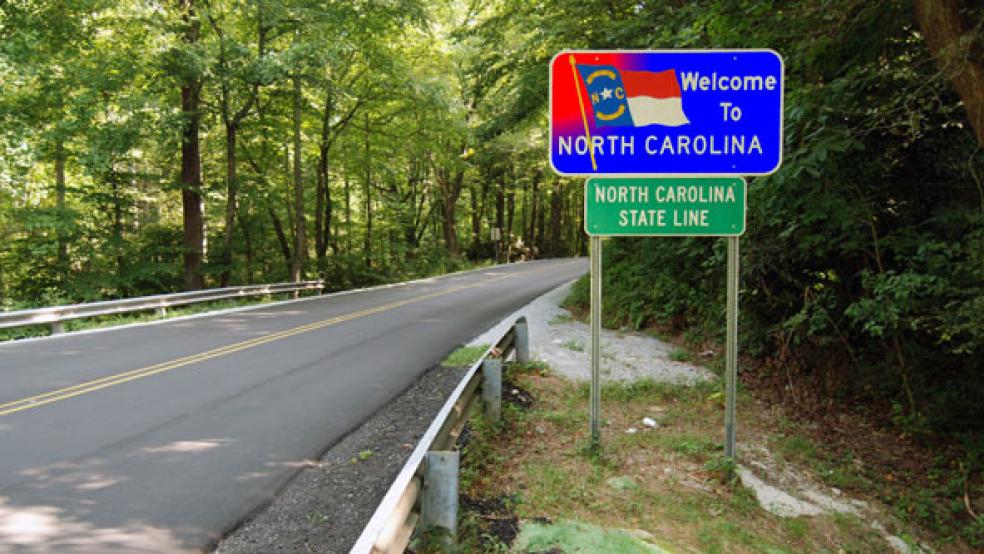Since Republicans took control of North Carolina’s governorship, State Senate and State House last year, they’ve rolled back taxes on business as well as business regulations. They’ve cut entitlement programs and placed restrictions on abortion clinics. Public school teachers are no longer eligible for tenure and are required to teach cursive.
It's now legal to carry guns in bars. After June Atkinson, state superintendent of public instruction, explained why state test scores would drop significantly this year, House Majority Leader Paul Stam reportedly told her to "stick to her knitting.”
But the change that is getting the most attention is the state's new voter ID law. It adds strict identification requirements, reduced early voting and made it harder to register to vote on Election Day.
The NAACP has already filed a legal challenge to the law, and the Justice Department is exploring a lawsuit. But Governor Pat McCrory, the former mayor of Charlotte who ran as a moderate, dismissed criticism of the law.
"Many of those from the extreme left who have been criticizing photo ID are using scare tactics,” McCrory said in a video responding to critics. “They’re more interested in divisive politics than ensuring that no one’s vote is disenfranchised by a fraudulent ballot."
Republicans have staunchly defended their actions. Republican State Senator Phil Berger said that eliminating tenure allowed principals to get rid of underperforming teachers while providing “the best teachers under the security of multi-year contracts.”
Republican State Senator Bob Rucho claimed the voter ID law, "is going to have a huge dividend for the state of North Carolina as far as restoring a level of confidence in government by making the electoral process secure." And McCrory said abortion regulations that require them to meet the same standard as outpatient surgical procedures make women safer.
Democrats are unconvinced. Each Monday, activists occupy the capitol building in Raleigh to protest the changes. Inevitably, some of them are arrested in a ritual that’s become known as Moral Monday. But they are powerless to stop the Tar Heel state's dramatic right turn.
But for Democrats, who hosted the 2012 presidential convention in North Carolina, there is a bright silver lining. Unstoppable forces are pushing the state from red to one that's trending blue. There is a growing backlash against Republican policies by independents, according to J. Michael Bitzer, an associate professor of politics and history at Catawba College in North Carolina that will push undecided voters toward Democrats.
RELATED LINK: CHARLOTTE: HOSPITABLE OR HOSTILE TO OBAMA AND DEMS?
“Moderate independents have seen the swing to the right as outside of the norm of a moderate North Carolina,” he said Thursday.
More importantly, demographic changes across the Tar Heel state are radically remaking the electorate. Hispanics and job seekers are flocking to urban centers like Charlotte and the Research Triangle, creating a large Democratic voting base.
Democrats may never regain their footing in the State House, allowing North Carolina to remain a Republic utopia at the state level for years to come. But on the national level, North Carolina is transforming from reliably red to decidedly purple - perhaps even a bit blue.
PUSHED RIGHT BY OBAMA
North Carolina has long been known for its pragmatic politics; no one party has controlled the government for more than 100 years. According to Bitzer, this changed in 2008 when Obama won the state.
"No body had expected it. It was a massive ground game operation that shook the establishment in North Carolina. The 2010 election was the tea party backlash."
Once Republicans took the state house, they began gerrymandering districts to skew Republican, he said. Republicans "controlled the rules of the game. That meant redistricting."
Bitzer said lawmakers were able to redraw district lines in a way that provides "a protection plan that will cover them for years to come." It is now nearly impossible for Democrats to win rural districts. When McCrory was elected, replacing Democrat Beverly Perdue, Republicans were able to undo years of progressive policy and implement a conservative agenda.
UNSTOPPABLE FORCES
One problem with this strategy is that it's turning off moderate, independent voters, as well as awakening the state's Democratic base. But Republicans in North Carolina have a larger demographics problem: the number of Democratic voters in urban areas is growing quickly.
According to Bitzer, all 13 urban counties in the state broke for Obama in 2012. These areas, like Charlotte and the Research Triangle, are growing quickly by adding jobs in the finance and tech sectors, respectively. In 1980, 1.3 million people lived in the Charlotte area, while only 635,181 lived in the Research Triangle. Now, 2.5 million live in the Charlotte area and 2 million live in the Research Triangle.
Both regions are firmly Democratic and are continuing to grow. At the same time, rural areas - the backbone of the Republican voter base - are shrinking.
The state's fast-growing Hispanic population is also bad news for Republicans. In 2000, Hispanics, who tend to vote Democratic, only made up 4.71 percent of the N.C. population. They now constitute 8.6 percent – the sixth fastest growth rate in the country - and as the graphic below shows, they are settling around cities.
In a state that was decided by 92,000 votes, these population trends are bad news for republicans. Combine that with an army of Democratic get-out-the-vote volunteers from places like Duke University or the University of North Carolina - Chapel Hill, and you have a recipe for Democratic success at the national level.
"We are going to become a more classic swing state because of demographic shifts and the real split in the state between rural and urban interests," Bitzer said. "The redistricting has helped Republicans in the legislature, but when you run statewide, if there are interesting Democrats on top of the ticket, well, it could make for an interesting race."





